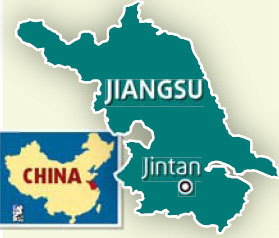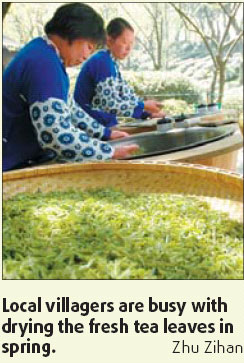Tea for two, and crabs too, in Jintan
My boyfriend at university used to say that when he kissed me he could smell Maoshan Qingfeng, a green tea from my hometown of Jintan, in Jiangsu province. Six years later, he became my husband.
Green tea is the specialty of Jintan, a small town in East China. The tea plantation, mainly located in Xuebu and Maolu villages, covers more than 2,500 hectares, on rolling hills 50 m to 100 m above sea level. The fertile and soft brown soil, plenty of rain and small lakes dot the plantation.
Almost every family in Xuebu and Maolu grows tea. When the fresh tea leaves sprout in early spring, the villagers start to pick and dry them. The quality of the tea depends on the color, scent and taste.
Maoshan Qingfeng is one of two top quality teas in Jintan, the other is Queshe, which literally means "the tongue of a bird", and refers to the shape of the leaves. Covered with fine white hair, each Queshe leaf can stand erect, like a bamboo shoot in water for three hours.
The green tea of Maoshan Qingfeng is named after Maoshan Mountain. The best time to climb it is in spring.
About 40 minutes drive west to Jintan, the 372.5 m high mountain is a Taoist shrine. It is said that in the Western Han Dynasty (206 BC-AD 24), three Taoists traveled there, built the temple on the peak and stayed to teach Taoism there.
The old Jintan saying goes: "Maoshan Taoists help visitors from far away, but neglect the locals." After visiting the temple on the peak, don't forget to see Qianyuan Temple at the foot of the mountain, where elegant women Taoists play the guqin (an ancient stringed instrument).
In addition to green tea, hairy crabs are another specialty I miss from my hometown. Every October, when my uncle comes to Beijing, he brings hairy crabs as gifts for his business partners, and at least 30 crabs for me to share with my colleagues.
It's great for me to taste crabs from my hometown in Beijing but it's even better to go back and eat crabs in a boat on Changdang Lake, where they come from. They are a favorite among gourmets in Jiangsu because of their plump meat and bright orange roe.
About 9 km southeast of Jintan, the 8,500-hectare Changdang Lake, connects with the Yangtze River in the north and Taihu Lake in the south, which is the third biggest lake in Jiangsu.
The last time I visited there was one autumn afternoon about 10 years ago. My parents, uncles and cousins drove to the shore and called a boat-restaurant. A motorboat took us to the center of the lake where several big house boats were floating.
We enjoyed the delicious crabs with yellow rice wine, the sun setting in the west, birds flying from the water, a gentle wind making ripples on the surface of the lake. What more do you need in life?
(China Daily 03/20/2008 page20)














